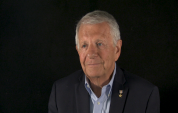6:45 | As a new co-pilot, you had to fly with a number of different pilots and they had two nicknames for the newbies. You were either a Cherry Boy or you were a Magnet Ass, depending on how much fire the aircraft took on a mission. David Samuels was flagged as a Cherry Boy, so he was much in demand. Despite that, on one mission, the ship was forced down by an RPG.
Keywords : David Samuels helicopter (chopper) pilot Vietnam co-pilot Cherry Boy Magnet Ass Chuck Blake Bob Hughes Tim Walters Viet Cong (VC) North Vietnamese Army (NVA) Rocket Propelled Grenade (RPG) gunship

Vietnam was calling him. Every day, David Samuels would see news coverage of Vietnam and, once he decided he wanted to be a pilot, he felt he would have to go there. The Air Force and the Navy required a college degree but the Army was desperate for helicopter pilots and would take anyone who proved they could handle it.
The military career of David Samuels was off to a rocky start. First, he had an altercation with the barber who was shaving his head when he arrived for basic training. Then, on a bivouac, he picked up a nasty case of poison oak, which nearly derailed his plans for flight training.
The civilian instructors at Fort Wolters were quite sadistic. They really enjoyed weeding out those who didn't have the talent to become pilots and they would try to distract you and trip you up. David Samuels prevailed and didn't let their head games distract him, despite the fact that helicopters were very difficult to fly.
Two things happened after David Samuels finished primary flight training, He convinced his fiance's father to agree to a wedding, and the helicopters got much larger at the next school. He went from tiny two seaters to big Huey's. He planned a late honeymoon after the Huey training was done and before deploying to Vietnam, but the Army had other plans.
Vietnam was a real culture shock for David Samuels. First, the heat and humidity was unbearable. How could anyone live in it, much less fight in it? Then, the undeveloped nature of the country was stark, definitely not like his native New Jersey. As a new helicopter pilot, he had to take a check ride and on it he had a helping of humble pie.
David Samuels, having just arrived in Vietnam, had to fly first as a co-pilot and, on his first mission, he was overwhelmed by the chaos and danger. What had he gotten himself into wanting to be a pilot?
The gunship platoon was elite in the company. David Samuels was determined to get in so he could shoot back at the enemy instead of just receiving fire. He turned on the charm and they let him in where he flew a modified Huey gunship which was, perhaps, the most sophisticated close combat weapon in the world.
The 135th AHC flew a lot of missions in support of many different units in the Mekong Delta, both US and South Vietnamese. Pilot David Samuels recalls that there were Korean Marines and one British mercenary, as well. It was dangerous work since their helicopters were constructed entirely of lightweight materials and were susceptible to damage from even small arms fire.
It was an experimental unit, combining US Army pilots and Australian Navy pilots in an assault helicopter company. Huey pilot David Samuels remembers the Aussies as good pilots and big drinkers who had their beer delivered monthly on pallets. There was also marijuana around and he was astounded at who might be indulging.
Gunship pilot David Samuels was on a gun run when unanticipated fire from off to the side knocked out his engine. He got the Huey down without crashing and he and the crew took the radios and guns and hustled to cover. That began a long wait for rescue.
Every night there were gunships on alert in case they were needed. Pilot David Samuels got a call from a ground unit that was under siege from a much larger force of VC and were just about overrun. The weather was too bad to fly but he and his crew agreed to go. Three times, they slogged through the rain and returned to refuel and re-arm and the enemy was chased back into Cambodia. The commander of the rescued unit made sure he was recognized for saving his hide.
Huey pilot David Samuels opines that, considering the way Vietnam turned out, maybe we should pick and choose which wars to get into with a little more wisdom.